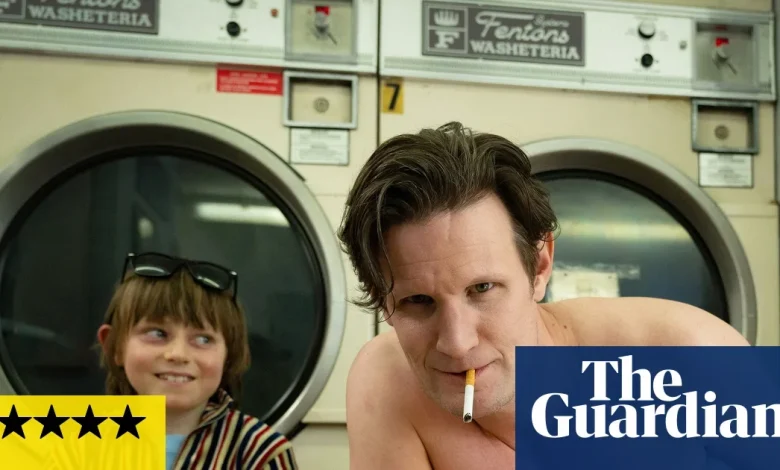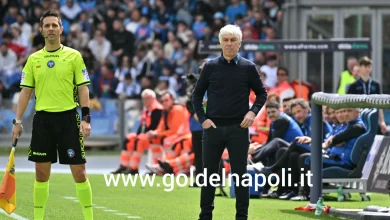The Death of Bunny Munro review – Matt Smith is pitch-perfect in Nick Cave’s crushing study in masculinity

The travelling salesman used to be a stock figure – a centrepiece for jokes about man’s priapism, the untameable wanderlust of the peen once free of its domestic shackles. The Death of Bunny Munro, adapted from Nick Cave’s 2009 book of the same name by Pete Jackson and keeping all its bleak tenderness and unforgiving brutality, gives us the tragedy that lies the other side of any comic character worth its salt.
Cosmetics salesman Bunny (Matt Smith, a brilliant and still underrated actor, plus the best Doctor of modern times, please send an SAE for my monograph on this subject) is out on the road, sampling another young lady’s wares, when we meet him. His wife, Libby (Sarah Greene, perfectly cast as a fierce, loving woman broken by depression and her husband’s choices) calls him. He dismisses her and returns to his sampling. When he returns the next day he finds that she has killed herself. They have a nine-year-old son, Bunny Jr, played by Rafael Mathé, who gives an absolutely wonderful, heartbreaking performance, treading the thinnest of lines between knowing everything and nothing about his father and about his own likely future. At first, Bunny Sr tries to palm him off on Libby’s mother (Lindsay Duncan), who, in a harrowing post-funeral scene, refuses. But when social services arrive to take the boy into care, Bunny’s pride or conscience is pricked. The pair light out of the window and head off on a road trip along the south coast, and a father-son bonding experience. Traditionally, these are good things. But Cave is not a traditional writer and this is not a traditional tale.
When Bunny can charm his customers into buying his unguents and his promises, life is good. A bit of money and a lot of sex are all he needs to get by. Junior watches in nervous awe. If nothing else, his father’s antics are a distraction for the motherless boy from his grief. “She must have wanted to die,” Junior says to one of the many strangers he meets while waiting for his father to finish – uh – charming a customer. “That’s why it’s not so sad.” And if the child is managing with sunglasses instead of the eye cream he needs for his chronic blepharitis, well, that’s all part of the adventure.
A fierce, loving woman broken by depression … Sarah Greene with Matt Smith in The Death of Bunny Munro. Photograph: Benedict Stenning/Sky UK, Clerkenwell Films
Gradually, of course, things fall apart. Bunny’s centre cannot hold. His simple but unassuageable appetites lead him further and further into trouble, and guilt too relentlessly tries to catch up with him. Bunny’s journey is interspersed with flashbacks to his youth, watching his own father – another Bunny, lest the egotistic circle be broken – neglect him in favour of finding women (“Fucking cool as cool,” Sr insists) and to moments of happiness with Libby before her depression, surely unrelated to her longing for him to stay faithful, set in. Junior has comforting visions of his mother, though she disappears when he decides to mimic his father cheering a stripper’s show in the pub – a moment that almost undid me.
The Death of Bunny Munro is only six episodes long, and their run times vary between around 30 and 50 minutes. This is generally a mark of quality and confidence and Bunny Munro is a perfect example of why – there is no padding here, no eking out, nor desperate compressions. Each act of the story is given the time it needs, and should stand as an example to others who are tempted to bloat or stymie their narratives instead of exploiting the great advantage modern broadcasting has given creators by uncuffing them from rigid time frames and forced ad breaks.
As a study in masculinity, in men handing on misery to men, deepening like a south coastal shelf as Bunny and son drive towards doom, it is as timely – for all, alas, that the book was written over a decade ago – as it is illuminating. The script and Smith do a pitch-perfect job of conveying the latent violence lying just underneath his and his cohorts interactions with women and how little the latter need to do to spark it. And they don’t ask for sympathy, only understanding, as they show Bunny as trapped as any rabbit in a snare by the lack of substance beneath his style and by the lessons he learned from his father before he was old enough to pick and choose between them. Maybe infidelity is in the genes but nurture is supposed to teach you to work against your flaws, not with them. Which way Junior – a sensitive, clever boy with an interest in the wider world that might save him – will go now that there is no mother to shelter him pulls you on through the darkening tale. The only hope you can cling to is that it’s set at a time before smartphones, otherwise the question would surely be settled before they’ve even cleared the window.
The Death of Bunny Munro aired on Sky Atlantic and is on Now in the UK and Binge in Australia





